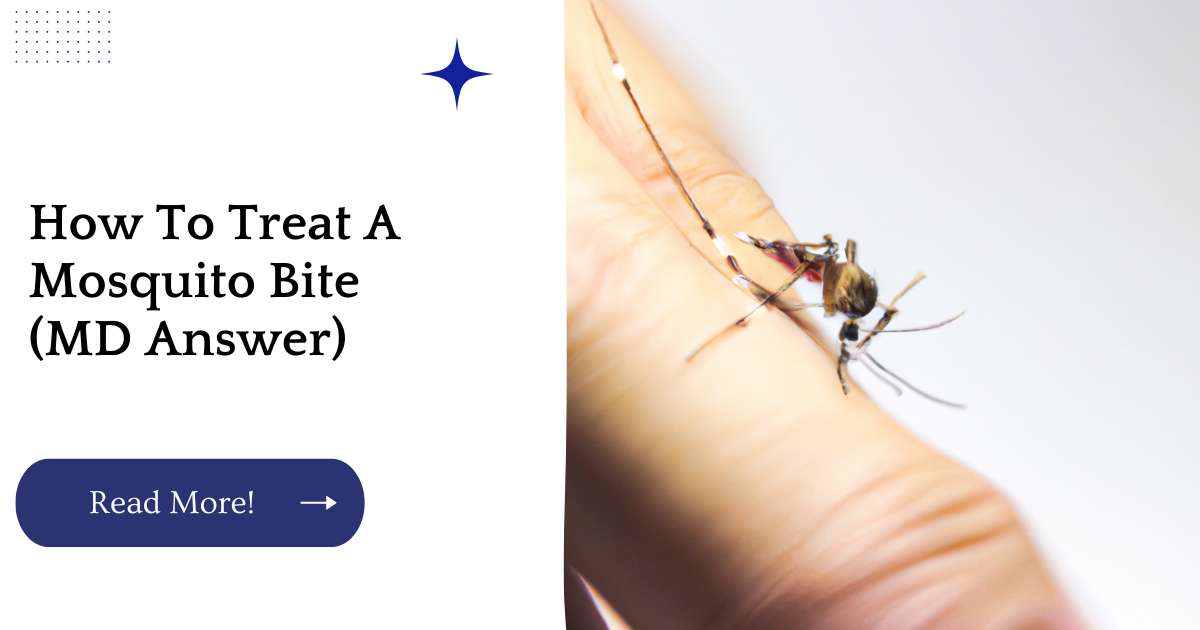If you’ve ever been bitten by a mosquito, you know how irritating it can be. The tiny insects are known for their ability to transmit disease, but they don’t just bite humans—they also feed on other animals and even plants!
| Key Takeaways |
|---|
| Mosquito bites can cause uncomfortable symptoms such as itching, swelling, and redness. |
| Mosquitoes can transmit several diseases, including West Nile virus and Zika virus. |
| To prevent mosquito bites, wear long-sleeved clothing, use insect repellent, and eliminate sources of standing water. |
| There are several home remedies and over-the-counter treatments that can relieve the symptoms of mosquito bites. |
| Controlling mosquito populations in your home and yard can help prevent bites and the spread of diseases. |
To help prevent the spread of harmful diseases, we want to share some tips on how to treat your mosquito bite.
1. Aloe vera
Aloe vera is a natural antiseptic, so it can help you get rid of the itch. This is because it contains salicylic acid and other chemicals that soothe your skin.
Aloe vera has also been known to reduce redness, irritation, and swelling in people who suffer from sunburns.
- Aloe Vera
- Ice cubes
- Baking soda
Don’t let mosquitos ruin your outdoor activities this summer. Our easy guide on getting rid of mosquitos will help you protect your home and yard from these pesky insects.
2. Apple cider vinegar
Apple cider vinegar is a natural antiseptic and anti-inflammatory. It can help reduce the itching and swelling, as well as the pain associated with mosquito bites.
To apply apple cider vinegar to a mosquito bite:
Put a small amount of apple cider vinegar on a cotton ball or pad and gently rub the affected area until it’s completely absorbed by your skin (about five seconds). Do this three times per day until the irritation goes away.
If you want to try something more convenient, consider purchasing an all-natural liquid soap with apple cider vinegar in it!
Simply apply according to directions on the bottle or package: typically one or two pumps are sufficient enough for your entire body (two pumps if you have sensitive skin).
| Benefit | Description |
|---|---|
| Anti-inflammatory | Reduces inflammation and swelling caused by mosquito bites. |
| Antibacterial | Prevents infection and promotes healing of mosquito bites. |
| Antipruritic | Relieves itching and discomfort caused by mosquito bites. |
| Acidic properties | Neutralizes alkaline mosquito venom and reduces irritation. |
| Easy to use | Can be applied topically or ingested for systemic benefits. |
3. Baking soda paste
To treat a mosquito bite with baking soda, mix equal parts water and baking soda to form a thick paste. Apply the paste to the bite, leave on for 10 minutes, then rinse off with water. Repeat if necessary.
Relieve the discomfort of mosquito bites with our simple tips for reducing swelling. You’ll be able to enjoy the outdoors again in no time
4. A cloth dipped in egg white
Egg whites are a great way to alleviate the itching and swelling caused by mosquito bites. To try this remedy, you’ll need a clean cloth or bandage and some raw egg whites.
Apply the egg white directly to your skin and leave it on for 10 minutes before washing it off with cold water. Repeat as needed until your symptoms subside.
5. Fresh garlic cloves and basil leaves
Garlic and basil are a natural way to relieve the itching from mosquito bites. If you have access to fresh garlic, rub it on your skin for instant relief or make a paste by mixing about four or five crushed garlic cloves with three or four basil leaves, then apply this paste on your bite for ten minutes.
If you don’t have any fresh herbs available, dried versions will do just fine—you can even mix them together if that’s what you have!
6. An ice cube or cold compress
When a mosquito bites you, the bite will swell up and itch. The best way to treat an itchy mosquito bite is by applying ice or cold compress to it.
Here are some ways you can do this at home:
Grab an ice cube from your freezer and place it on the affected area for 10-15 minutes.
Take a cold compress (a towel soaked in water), apply it over the bite area, and hold it tight for 10 minutes. Try not to rub too much as this could cause further irritation around your skin area where you were bitten by mosquitoes; just let the compress do its job!
Put an ice pack on top of your bites using a bag filled with crushed ice or frozen peas wrapped in a cloth towel or shirt sleeve until they feel numb once again—this usually takes about 20 minutes depending on how many times you’ve been bitten by those annoying little blood suckers before now!
Spending time in your yard should be relaxing, not stressful. Find out how to get rid of mosquitos in your yard with our helpful tips and tricks.
7. Witch hazel
Witch hazel is an herbal remedy that has been used for centuries as an antiseptic, astringent and even anti-inflammatory. It can be used to treat insect bites as it reduces swelling and irritation of the skin.
Witch hazel can be applied directly onto a mosquito bite with a cotton swab or pad. This will help reduce redness and swelling caused by the bite.
You should also apply this directly on your lips if you have been bitten by mosquitoes while drinking water or eating food outdoors during summer time as this can help prevent infections from entering into your mouth through open wounds from mosquito bites.
8. Toothpaste
If you have a mosquito bite that is itching like crazy, you can use toothpaste to soothe it. The menthol in toothpaste will help with the itching and inflammation.
Toothpaste contains ingredients that can help relieve an itch from a mosquito bite. Apply a small amount of the gel directly to your skin, covering any area where it’s red, swollen or painful. Leave it on for about 10 minutes before rinsing off with warm water (and don’t forget to gently pat dry).
| Benefit | Description |
|---|---|
| Antibacterial | Reduces the risk of infection in mosquito bite wounds. |
| Cooling effect | Provides a cooling sensation to alleviate itching and pain. |
| Anti-inflammatory | Reduces swelling and inflammation caused by mosquito bites. |
| Soothes the skin | Calms the skin and promotes healing of mosquito bite wounds. |
| Widely available | Toothpaste is easily accessible and affordable. |
9. Lemon juice and water
If you have a mosquito bite that’s starting to get itchy and painful, try applying lemon juice to the area.
The citric acid in lemons can help with the itching, redness, swelling and pain associated with mosquito bites. It also helps reduce irritation so your bite doesn’t feel as irritated.
If you don’t have any lemons or don’t want to use them (for example if you’re allergic), try soaking your bite in warm water mixed with a little bit of salt for 30 minutes instead.
Take back your outdoor space with our proven ways to keep mosquitos away. From mosquito-repelling plants to DIY traps, we’ve got you covered
10. Ammonia and water mixture
If you have ammonia at home, then you can use this to treat mosquito bites as well. Mix half a cup of ammonia with one cup of warm water and soak a cotton ball in it. Apply it on the infected area for 10 minutes and rinse off with cold water. Repeat if necessary.
11. Calamine lotion
Calamine lotion is a topical cream that can help relieve itching and irritation caused by insect bites. It contains zinc oxide, which is a drying agent that helps reduce inflammation and swelling. The lotion can be used on the face, hands, or body to provide relief from itching.
12. Rubbing alcohol and water solution
You can make a solution of rubbing alcohol with water. The ratio of water to rubbing alcohol is 1:1, but you can vary it slightly if you have different-sized containers.
To apply the solution, soak a cotton ball or cotton swab in the mixture and dab it on your bite several times.
It’s important to clean off any leftover mixture as soon as possible.
This will help prevent infection and reduce itching.
Rubbing alcohol is used because it kills bacteria by removing lipids from the surface of cells and dehydrating them.
Water is used because when mixed with alcohol, it creates a solution that is cold enough to cool down your skin while also preventing irritation from direct contact with rubbing alcohol.
If you’re looking for a way to prevent mosquito bites without repellent, our guide has everything you need. Learn about natural deterrents and other protection methods to stay bite-free.
Conclusion
With these tips, you should be able to treat those pesky mosquito bites. If the itchiness persists for more than a day or two after treatment, we recommend seeing your doctor.
Further Reading
Learn more about the diseases that mosquitos can carry and the symptoms to watch out for with the CDC’s guide to mosquito bite symptoms.
The Cleveland Clinic provides helpful information on how to identify and treat mosquito bites in their article on mosquito bites.
Find relief for mosquito bite itch with these home remedies for mosquito bites from Healthline.
FAQs
What are the symptoms of mosquito bites?
Mosquito bites can cause a range of symptoms, including redness, swelling, and itching. In some cases, they can also transmit diseases such as West Nile virus or Zika virus.
Are mosquito bites dangerous?
While most mosquito bites are harmless, they can transmit diseases such as malaria, dengue fever, and yellow fever. It’s important to take steps to prevent mosquito bites and seek medical attention if you experience severe symptoms.
How can I prevent mosquito bites?
To prevent mosquito bites, wear long-sleeved shirts and pants, use insect repellent, and eliminate sources of standing water around your home. You can also use mosquito nets and screens to protect yourself.
How can I treat mosquito bites?
To relieve the symptoms of mosquito bites, you can use over-the-counter anti-itch creams, apply a cold compress, and take oral antihistamines. Some home remedies, such as aloe vera or baking soda, may also be effective.
How can I control mosquitos in my home or yard?
To control mosquitos in your home, eliminate sources of standing water, use screens on windows and doors, and use insect repellent or insecticide. In your yard, make sure to remove any debris or standing water and use mosquito-repelling plants or DIY traps.

Hello! I’m Hellen James, and I write about how to keep pests from invading your home. For the last 10 years, I’ve been working in pest control and am excited to share my expertise with you!


